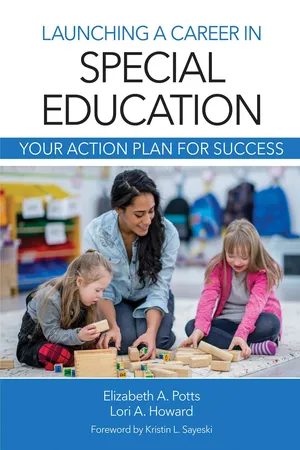
Launching a Career in Special Education
Your Action Plan for Success
- 232 pages
- English
- ePUB (mobile friendly)
- Available on iOS & Android
About this book
For new special educators, navigating the first few years on the job can be a complex challenge. Help is here in this positive and practical resource, your friendly guide to taking what you learned in your teacher prep program and applying it successfully in your classroom. Developed by two special education experts with decades of experience, this book gives you a complete action plan for on-the-job success—from managing everyday details like paperwork and classroom routines to mastering big-picture strategies for behavior management, collaboration, and assessment. Potts and Howard speak directly to you, talking you step by step through key procedures, addressing common questions and concerns, and giving you sound advice you can use for your whole career. Throughout the book, relatable quotes from new and seasoned educators offer real-world perspectives on the joys and challenges of teaching.
Whether used as a quick-start guide for novice teachers or a supplemental textbook for future special educators, this how-to resource will help you—and your students—thrive in your first few years in the classroom.
DISCOVER HOW TO:
- Set up your classroom
- Craft IEPs that reflect the student's and family's needs and goals
- Plan differentiated lessons that address IEP goals
- Find, use, and evaluate evidence-based practices
- Choose or develop classroom assessments that are reliable and valid
- Use positive strategies to reduce challenging behavior
- Prepare yourself and your students for a classroom observation
- Demonstrate professionalism in everything from your attire to your online conduct
- Collaborate effectively with other teachers, paraprofessionals, administrators, and support staff
PRACTICAL MATERIALS: In each chapter, Planning Timeline boxes highlight which tasks to do when; Special Topics boxes guide you through key issues related to ethics, co-teaching, and English language learners; and Reflection boxes give you activities and checklists to help you apply what you learned.
Frequently asked questions
- Essential is ideal for learners and professionals who enjoy exploring a wide range of subjects. Access the Essential Library with 800,000+ trusted titles and best-sellers across business, personal growth, and the humanities. Includes unlimited reading time and Standard Read Aloud voice.
- Complete: Perfect for advanced learners and researchers needing full, unrestricted access. Unlock 1.4M+ books across hundreds of subjects, including academic and specialized titles. The Complete Plan also includes advanced features like Premium Read Aloud and Research Assistant.
Please note we cannot support devices running on iOS 13 and Android 7 or earlier. Learn more about using the app.
Information
Table of contents
- Cover
- Title Page
- Copyright
- Contents
- About the Authors
- Foreword
- Preface
- Section I: Introduction
- Chapter 1: Getting Started
- Section II: The Daily Work of a Teacher
- Chapter 2: Understanding Inclusion
- Chapter 3: Lesson Planning
- Chapter 4: Research-Based Interventions
- Chapter 5: Classroom Assessment
- Chapter 6: Classroom Management
- Chapter 7: Behavior Management
- Section III: Beyond Instruction
- Chapter 8: IEP: The Legal Document
- Chapter 9: Classroom Observations
- Section IV: Working as a Professional Within a School
- Chapter 10: Cooperating Teacher: Your New Best Friend and Mentor
- Chapter 11: Professionalism
- Chapter 12: Co-Teaching
- Chapter 13: Communicating With Others
- Chapter 14: Teaching as a Career
- Appendix A: High-Leverage Practices
- Appendix B: Book List
- References
- Index